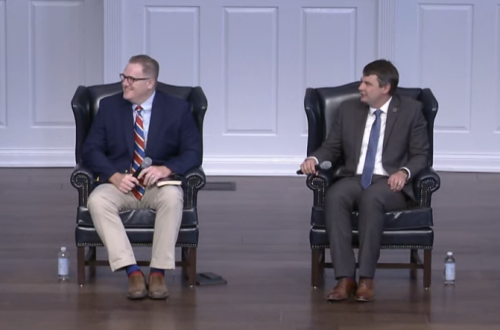I was just rereading an essay I wrote about six years ago on what the bible teaches about homosexuality. That essay begins with a discussion of Brian McLaren’s then recent affirmation of committed homosexual relationships.
It is strange to read that essay now and to consider in retrospect how quickly McLaren faded from evangelical view. At the time, the emerging church still had some purchase within the evangelical movement. Now that entire project is defunct and so are its major proponents. They pushed the very edges of the leftwing of the evangelical movement until they pushed themselves right out of the movement. Many of them did so by adopting unorthodox positions on sexuality.
The ascendancy of Emergent seems like ancient history, but it really wasn’t that long ago. How quickly its heterodoxy doomed it to irrelevancy and demise. Evangelicals no longer look to the McLarens, the Tony Joneses, or the Rob Bells for sound guidance on the faith once for all delivered to the saints.
This recent history is the playing-out of Jesus’ words in John 10:
The sheep hear his voice, and he calls his own sheep by name, and leads them out. When he puts forth all his own, he goes before them, and the sheep follow him because they know his voice. And a stranger they simply will not follow, but will flee from him, because they do not know the voice of strangers (John 10:3-5).
At the end of the day, the church follows the voice of the Lord Jesus and will not go after the voice of “strangers”—those offering a teaching that is contrary to Christ and his word. Those who do go after the “strangers” are revealing themselves not to have been a part of the fold to begin with. They leave the church because they were Christians in name only.
They went out from us, but they were not really of us; for if they had been of us, they would have remained with us; but they went out, in order that it might be shown that they all are not of us (1 John 2:19).
Ed Stetzer wrote a really helpful essay yesterday about how “Evangelicals across the Spectrum Are Clarifying Marriage as a Core Belief.” He shows that evangelical institutions are in the process of making clear what they have always believed about marriage and sexuality—that marriage is the union of one man and one woman and that sex is only permitted within that marriage covenant.
Almost immediately, Matthew Vines posted a string of tweets protesting Stetzer’s claims. Vines argues that the evidence shows that evangelicals are actually moving toward affirmation of gay marriage.
I think it is possible that Stetzer and Vines may both be right (sort of). Stetzer is simply observing how evangelical organizations are clarifying and reaffirming the traditional view, and he is right about that. Vines is simply observing the fact that some people associated with evangelical Christianity are embracing gay marriage. And he is right about that.
Vines points to trends among millennials as evidence of his claim. Vines is right about those larger demographic trends, but he is wrong about what they mean. Yes, millennials are far more open to gay marriage than their parents or grandparents. And yes, that will likely influence some within the evangelical movement to embrace gay marriage as well. But what does that mean? It doesn’t mean that the Christian faith is changing its posture on marriage. It means that some people currently associated with evangelical Christianity will be leaving us. They will follow a “stranger’s” voice right out of the faith.
It is not hard to predict what happens after the “strangers” leave orthodox Christian teaching. We’ve seen this countless times before. As it happened with Emergent and with theological liberalism, so it will happen again. The “strangers” move on from the faithful, and the faithful move on from the “strangers.” There is a sad parting of ways. But the church remains the church, and the faith remains the faith. The true sheep will follow the voice of their shepherd come what may. The strangers’s ascendency is eventually forgotten, and the church of the Lord Jesus endures. The voice of the strangers will grow quiet, and their memory will grow more and more distant.
Peter Leithart’s 2013 prediction is proving right:
God has his winnowing fork in his hand, and he’s ready to use it. There’s likely to be a lot of chaff, blown away like mist. But there will be a harvest. We’re being sent into an oven, but Jesus will crush the grain of the harvest so that, baked in the fire of the Spirit, it will become bread for the life of the world.
What we are witnessing in the evangelical movement right now is a winnowing—a parting of ways. It rightly grieves us because no one relishes division or departures from God’s truth. But it is all important that we see what this means. This division is real and necessary for anyone turning away from what the scriptures teach on marriage and sexuality. And all sides would do well not to obscure just how high the stakes really are.
POSTSCRIPT: I have noticed a pretty consistent progression among those who eventually embrace gay marriage. It goes like this:
(1) Oppose gay-marriage: Everyone starts here, or at the very least they appear to start here.
(2) Oppose taking a stand on the question: Persons in this stage are becoming aware of how offensive the traditional view is to those outside the church. Their initial remedy is to avoid that conflict by not talking about the Bible’s teaching on this subject. In Brian McLaren‘s case, he urged evangelicals to observe a 5-year moratorium on talking about gay marriage. For Jen Hatmaker, she advocated going “into the basement,” where we don’t talk about these things but just love people. Choosing to avoid the question is never a final answer for anyone in this stage.
(3) Affirm gay marriage: At some point during the “we’re not talking about this anymore” stage, those who used to oppose gay marriage find grounds to affirm it. Some do it by questioning the Bible’s truthfulness. Others do through revisionist interpretations of the Biblical text. In either case, proponents end up affirming what the Bible forbids.
(4) Vilify traditional marriage proponents: Persons in this stage not only affirm gay marriage. They also view traditional marriage supporters as supporting invidious discrimination against gay people. They will adopt the rhetoric of Christianity’s fiercest critics to describe believers who hold to the Bible’s teaching on marriage and sexuality. David Gushee adopted this posture simultaneously with his embrace of gay marriage. In 2014, he wrote this to the gay people “oppressed” by the Church’s teaching:
I do join your crusade tonight. I will henceforth oppose any form of discrimination against you. I will seek to stand in solidarity with you who have suffered the lash of countless Christian rejections. I will be your ally in every way I know how to be… Traditionalist Christian teaching produces despair in just about every gay or lesbian person who must endure it… It took me two decades of service as a married, straight evangelical Christian minister and ethicist to finally get here. I am truly sorry that it took me so long to come into full solidarity with the Church’s own most oppressed group.
It usually takes some time to move from number 2 to number 3. McLaren and the Hatmakers both took four years to make that transition. But the transition from 3 to 4 can sometimes happen very rapidly. My observation, however, is that anyone who makes it to 3 eventually makes it to 4 also.



